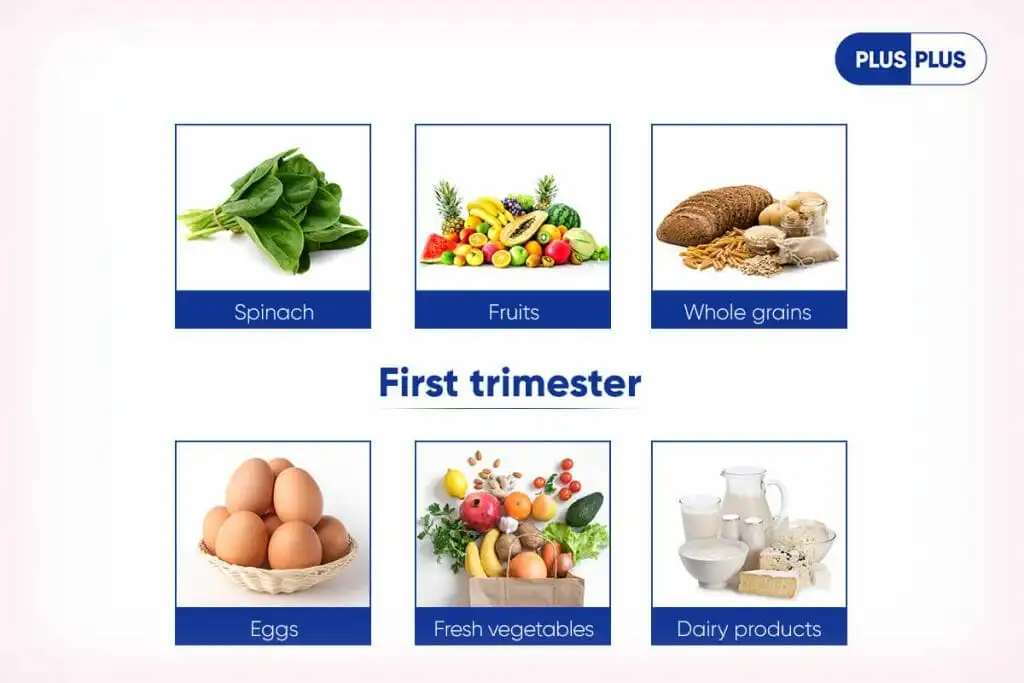Pregnancy is a long, memorable, and an exciting journey for any woman. At times, it can be testing, tiring, and taxing too. The whole 40 weeks of the gestation period of a human is classified into three trimesters based on the fetal development stages. The first 13 weeks are considered the First Trimester. For optimal health and development of baby first trimester food chart play crucial role.
First Trimester
The first trimester is the most critical stage. This is when mothers get to know that they are pregnant and start experiencing various pregnancy symptoms. Early pregnancy symptoms differ from woman to woman. While come might experience elevated energy levels, others may feel unexplained fatigue and mood swings.
Some of the symptoms that you may experience during the first trimester are:
- Nausea
- Vomiting
- Lack of appetite
- Disinterest in daily routine
- Frequent urination
- Tenderness in breast and nipples
- Feeling tired and energy less
Significance of the first trimester
The first trimester is the stage when the development of the baby’s organs starts. The whole-body structure, arms, legs, fingers, and toes, the internal organs, the central nervous system, and the appearance of facial features take place in the first trimester.
The very first heartbeat of the baby is also heard during the first trimester. Muscles start developing, and the vocal cord begins to grow at this stage. The white blood cells begin their formation in this trimester.
To state it in simple terms, the first trimester is a stage of rapid development of the fetus cells. Hence, it holds crucial importance in terms of the healthy diet and nourishment of the mother.
Essential nutrients during the first trimester

Folic acid is the most important. Protein, Vitamin C, and Vitamin A are some of the essential vitamins for the first trimester. By following a healthy diet chart as prescribed by your doctor and supplanting with multivitamins for pregnancy, you can make sure that these vitamins are supplied to your body at an optimal level.
Many new mothers start getting apprehensive about their vitamin intake and encounter many doubts in their mind:
- What does vitamin C do in pregnancy? What is the most crucial nutrient for a pregnant woman?
- When should I stop taking folic acid during pregnancy?
- What happens if skip my prenatal vitamins during pregnancy?
- Is it okay to switch prenatal vitamins during pregnancy?
To find proven answers to such questions about multivitamin pills for pregnancy, the best a pregnant woman can do is to take the guidance of a reputed doctor. They would recommend a comprehensive blood report, examine your health, and suggest the best prenatal vitamins for pregnancy.
First Trimester Food Chart
Many mothers get this advice during their early pregnancy– “You should now eat for two!” While this is true that the mother should contemplate the nutritional needs of both the baby and her, it does not mean that she starts doubling her calorie intake! The little baby is still happily forming and developing in the mother’s womb, and thus doubling of calories is nowhere necessary.
Instead, pregnant women should focus on meeting their daily dose of vitamin levels essential during pregnancy. The nutritional requirements of women and her metabolism rapidly rise when compared to normal levels. Thus, it is essential to cater to that increased demand through a wholesome diet and multivitamin tablets for pregnancy.
Here is a list of food items about what to eat during the first trimester:
Spinach: This is a rich source of folic acid. Folic acid is one of the most vital vitamins for pregnancy. Doctors also prescribe folic acid supplements to women who are planning to conceive soon. Consume spinach in boiled form such as soup or dal, instead of raw, as raw foods are best avoided during pregnancy.
Fruits: Lemons, oranges, watermelons, mangoes, bananas, etc. contain essential micronutrients that lessen the troubling symptoms of the first trimester. Check with your doctor about what time is best suited for their consumption, and about the portions of their intake.
Whole grains: Whole grains such as corn millets, and rice are very rich in Vitamin B. They help in the development of the newborn’s muscles and tissues.
Eggs: Boiled eggs are a good source of protein, calcium, and vitamin D. Pregnant women should include them in their diet. Avoid adding too much oil or salt when trying to take eggs in other forms. Also, the intake of raw or half-boiled eggs is not advisable for pregnant women.
Fresh, boiled, and dark-coloured vegetables: Vegetables such as broccoli, carrot, beetroot, okra, beans, etc. help in offering all essential micro vitamins through diet. They can be consumed in boiled and slightly grilled or sautéed form.
Dairy products: Milk, curd, and yogurt are rich sources of essential fats and calcium for mothers. They also provide energy and avoid acidity in pregnant women. Ensure that milk is boiled and cooled before consumption. Prefer taking homemade curd and yogurt to prevent the risk of preservatives from canned foods.
TrimacareTM T1 – Nutritional supplements for the first trimester
Most women feel a lack of energy and cannot focus on obtaining all the nutrients during their first trimester. TrimacareTM offers a comprehensive range of multivitamin tablets for pregnancy in India, specifically designed to meet the nourishment needs of Indian women.
TrimacareTM multivitamin tablets for the first trimester solve the nutritional needs that a woman needs during her first trimester. They are entirely plant-based and vegan. These tablets are also formulated as per Indian Council of Medical Research’s (ICMR) and World Health Organization’s (WHO) guidelines; thus, they promise to be the best vitamin supplements for pregnancy for Indian women.
Just one pill a day of TrimacareTM T1 ensures that you are completely taking all the care for you and your baby.
Conclusion
If you find any symptoms of early pregnancy, it means the first trimester might have already started. Check with your doctor and clarify all your doubts related to what vitamins are good for pregnancy. Request for a personalized diet chart and nutritional supplements that suit you. It is always advised that pregnant women take any nutritional supplements only after getting a comprehensive test done by their doctor, and solely on their prescription.
Frequently Asked Questions:
1. What are some nutritious foods to include in the first trimester diet during pregnancy?
Nutritious food sources to remember for the primary trimester diet during pregnancy incorporate salad greens like spinach and kale, organic products, for example, oranges and berries, entire grains like oats and earthy coloured rice, lean proteins like chicken and tofu, dairy items like yogurt and cheddar, and sound fats like avocado and nuts.
2. Is it safe to consume seafood during the first trimester of pregnancy?
Yes, seafood is generally safe to eat during pregnancy’s first trimester. Notwithstanding, it’s fundamental to pick low-mercury choices like salmon, shrimp, and trout, and cut-off the admission of high-mercury fish like swordfish and shark.
3. Can I drink coffee during the first trimester of pregnancy?
Restricting caffeine consumption during the first trimester of pregnancy is generally suggested. It’s ideal to talk with your doctor about whether it’s safe for you to consume espresso or charged refreshments and how much is proper.
4. Are there any foods to avoid during the first trimester of pregnancy?
Indeed, there are sure food varieties to stay away from during the first trimester of pregnancy. These incorporate crude or half-cooked meat and fish, unpasteurized dairy items, shop meats and wieners except if warmed completely, high-mercury fish, and food sources containing inordinate measures of caffeine or fake sugars.
5. How can I ensure I’m getting enough nutrients during the first trimester of pregnancy?
You can guarantee you’re getting an adequate number of supplements during the primary trimester of pregnancy by eating a decent eating regimen that incorporates various organic products, vegetables, entire grains, lean proteins, and solid fats. Accepting prenatal vitamins as suggested by your doctor can likewise assist with filling any nourishing holes.
A Certified Nutritionist with a rich healthcare background in health journalism, the author has immense experience in curating reader-friendly, engaging, and informative healthcare blogs to empower readers to make informed pregnancy-related decisions.













